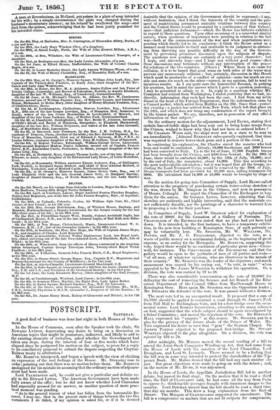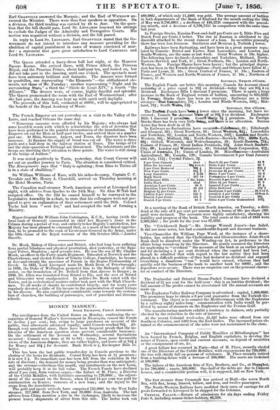POSTSCRIPT.
SATURDAY,
A good deal of business was done last night in both Houses of Parke- ment.
'In the House of Commons, soon after the Speaker took the chair, Sir EDWARD Lyrrozr deprecating any desire to bring on a discussion on American topics that might be premature, indiscreet, and likely to add to the existing elements of irritation, asked whether the Government had taken any steps, during the interval of four or five weeks which have elapsed since he postponed his motion on the subject, to press for a reply to its conciliatory proposal to submit the dispute respecting the Clayton- Buhver treaty to arbitration ? Mr. ROEBUCK interposed, and began a speech with the view of eliciting an expression of the real feelings of the House. Mr. Dental= rose to ceder, pointing out that there was no motion before them. Mr. Roanucg apologised for his mistake in assuming that the ordinary motion of adjourn- ment .had been made.
Lord PALMERSTON said, he could not give a particular and definite re- ply to Sir Edward Lytton. The American Government have been made fully aware of the offer ; but he did not know whether Lord Clarendon had especially pressed for an answer, as another question of more prac- tical moment was pending.
"As to the general tenour of what has fallen from the honourable Ba- ronet, I may say, that in the present state of things between the two Go- vernments I do think, if my opinion is asked for, or if it be deemed
desirable that the opinion of the Government should be expressed-1 say, without hesitation, that I think the interests of the country and the pro- speot of maintaining permanent amicable relations between this country and the United States would he promoted by a continuance of that forbear- anoe-that judicious forbearance-which the House has hitherto exhibited in regard to these questions. rpm other occasions of a a somewhat similar nature, when questions of importance were pending in relation to the last war-both at the commencement of the war and when negotiations were pending which finally led to its condusion-I think the House anted in a manner most honourable to itself and creditable to its judgment in abstain- big from throwing any possible difficulty in the way of the Govern- ment by provoking premature discussion upon the subjects of dispute. The questions now pending are certainly of a very grave character ; but I hope, and sincerely hope-and I hope not without good reason-that those discussions may terminate without any interruption of the peace- ful relations of the two countries. (Cheers.) Where there is no cause for collision; it is to be hoped that good sense on both sides of the water may prevent any mmeeessary collision • but, certainly, discussion in this House which must be productive of a oorillict of opinions-some too much on one side and some too much on the other-cannot, in my opinion, fail to tend to injurious results. As I am quite sure the honourable Baronet, in putting his question, had in mind the answer which I gave to a question yesterday, I may be permitted to allude to it. In reply to a question whether Mr. Crampton had retired from Washington, I stated yesterday that we had, in- directly, information that such had been the case. I find from my noble friend at the head of the Foreign Department, that the information came by a tunard.paeket, which sailed from Halifax on the 22d. Since that-yester- day evening-a packet has arrived from New York, which left that place on the 24th, and which does not bring any confirmation of the report brought by the former packet. We are, therefore, not in possession of any official information on that subject."
On the ordinary motion for the adjournment, Lord Bien°, stating that certain line-of-battle ships had been sent out to bring home troops from the:Crimea, wished to know why they had not been too ordered before ?
Sir CHARLES WOOD said, the ships were not in a state to be sent to sea immediately. [Admiral BERKELEY subsequently explained, that time was required to remove lower-deck guns and a portion of the crew.] In continuing his explanation, Sir Charles stated the number who had been and would be embarked. Already, 10,000 Sardinians and 2600 horses had been conveyed to Italy. Up to the 1st of Jun; 17,000 English troops had been brought from the Crimea, and 4000 front Soutari. By the 20th of June, there would be embarked 10,000; -by the 10th of July, 18,000i .ond by the end of July, the remainder, about 14,000. This was according to the most unfavourable calculation ; but it was hoped that all the trams, in- cluding the Land Transport Corps, would be removed by the 30th of July. Steam transports had been provided for 32,000 men, sailing transports for 9000. He calculated that 14,000 or 16,000 would be brought by ships of war.
On the motion for going into Committee of Supply, Lord ELCSIO called attention to the propriety of purchasing certain water-colour sketches of the war, drawn by Mr. Simpson in the Crimea, and now in possession of Messrs. Colnaghi. He urged the Chancellor of the Exchequer to buy them for the nation. Sir GEORGE LEWIS, however, admitting that the sketches are authentic and highly interesting, said that the materials are not sufficiently durable,, nor the paintings of a character to warrant him in proposing a vote for their purchase.
In Committee of Supply, Lord W. Gatzuzm asked for explanation of the vote of 20001. for the formation of a Gallery of Portraits. The CHANCELLOR of the EXCHEQUER stated that no plan had yet been laid down. It is intended, in the first instance, to have a temporary exhibi- tion, in the new iron building at Kensington Gore, of such portraits as may be voluntarily lent. Mr. SPOCCPER, Mr. 1V. Wittratzs, DAVIES, and Mr. S. G. PHILLIMORE objected to the vote, as a waste of public money on a sentimental leeling, as the beginning Of great expense, as an outlay for the Metropolis. Mr. Romero-1r, supporting the vote, hoped there would be no exclusion of particular great men-Crom- well, for instance. The CHANCELLOR of the EXCHEQUER said that the gallery would be open to the portraits of men of all parties and sects- " of all men of whatever opinions, who are illustrious in the annals of their country." Mr. SPOONER was the leader of the objectors ; and much amusement was caused by his crying out, "In vain, in vain!" when appealed to by Mr. JAMES M‘Gnecon to withdraw his opposition. On a division, the vote was carriedby 97 to 28.
There was also considerable conversation on the vote of 10,000/. for defraying the cost of removing the Science and Art Branch of the lin- eation Department of the Council Office from Marlborough House to Kensington Gore. Here again Mr. Srootren was the Opposition leader ; Mr. DISRAELI the defender of the vote. It was passed without a division.
The next vote led to an unexpected result. It proposed that a sum of 24,700/. should be applied to construct a road through St. James's Park from Pall Mall to Buckingham Gate, and for a foot-bridge over the orna- mental water. Lord ROBERT GROSVENOR, adverting to the many schemes on foot, suggested that the whole subject should be again investigated by a Select Committee ; and moved the rejection of the vote. Sir Beiersinzr HALL expressed his " surprise " at this course. Mr. SPOONER put in a lea for the privacy of the future abode of the Prince of Wales. Mr. Trra expressed his desire to save that " gem " the German Chapel. Sir JOSEPH PAxTos objected to the proposed foot-bridge. Mr. STUART WORTLEY objected to the plan altogether. On a division, the vote wag; rejected by 192 to 70.
After midnight, Mr. MALINS moved the second reading of a bill to amend the Joint-Stock Companies Winding-up Act, that had come from the House of Lords with the sanction of the Lord Chancellor, Lord Brougham, and Lord St. Leonards. There seemed to be a feeling that the bill was in some•way intended to protect the shareholders of the Tip- perary Bank. Mr. Maims denied that the bill had any such'sinister ob- ject. But great objections were made to going on with the debate ; and, on the motion of Mr. Hume, it was adjourned.
In the House of Lords, the Appellate Jurisdiction Bill led to another debate, but passed its final stage. On the motion that it be read a third time, the Earl of Cr.sarezirry said, he had come all the way from Paris to oppose it ; thinking life peerages fraught with imminent danger to the country. Lord DENMAN moved that the bill should be read a third time that day six months. This drew a long explanation from the Earl of Danny. The Marquis of CLANRICARDE supported the amendment. The bill is a compromise on matters that are not fit subjects for compromise. Earl GnasrviLLE answered the Marquis ; and the Earl of Wm-m.0w an- swered the Minister. There were thus four speakers in opposition. On a division, the third reading was carried by 44 to four. On the ques- tion that the bill should pass, Lord Sr. LEONARDE renewed his attempt to exclude the Judges of the Admiralty and Prerogative Courts. His motion was negatived without a division, and the bill passed.
In reply to Lord Sr. Lsoswins Earl Glum, tux stated that the Go- vernment do not intend to introduce any measure providing for the abolition of capital punishment in cases of women convicted of mur- der: a statement that gave great satisfaction to Lord CAMPBELL and Lord Sr. LEONARD&



































 Previous page
Previous page